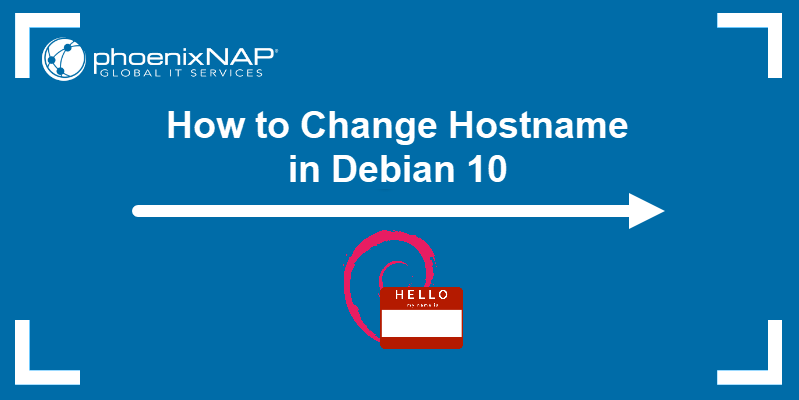how to change the hostname in debian
Introduction
A hostname is a label used to place your organization on a network. Yous can alter your hostname in Debian 10 (Buster) by using the hostname command or editing organization files.
In this tutorial, we will cover unlike methods y'all can use to change the hostname in Debian 10.

Prerequisites
- A system running Debian 10 (Buster)
- An account with sudo level privileges
- Access to the last window/command line
Cheque the Current Hostname
Employ the following command to check the current hostname:
hostname The output displays the current hostname equally plain text:

Change the Hostname
The first method involves using the hostname command to modify the system name. The hostname control is used to obtain and change the system'south hostname.
It is of import to note that any changes made using the hostname command are temporary. Unless yous use the permanent method of changing the hostname outlined beneath, information technology will revert back to its original value afterwards the next system reboot.
Follow the steps below to modify the hostname:
1. Changing the hostname requires a user with sudo/root permissions. To switch to the root user, enter:
sudo -south ii. Utilise the hostname command to set a new hostname:
hostname [name] Where:
-
[proper name]: The new hostname yous desire to set upwards.
In this example, we are using phoenixNAP as the new hostname:
hostname phoenixNAP three. Cheque if the new hostname is set up correctly:
hostname 
Change the Hostname Permanently
At that place are two ways to permanently change your hostname in Debian 10:
- Using the
hostnamectlcommand; - Editing the hostname file.
Regardless of the method you use, you besides need to edit the arrangement'south hosts file to match the changes in hostname.
To change the hostname permanently:
1. As the root user, open the hostname file:
sudo nano /etc/hostname The commencement line of the hostname file lists the electric current hostname. Replace it with the new name you want to set up up:

Press Ctrl+X to exit the file, so type Y and printing Enter to save the changes.
Another method of setting a new permanent hostname is by using the hostnamectl command:
hostnamectl set-hostname [proper name] two. Open the hosts file:
sudo nano /etc/hosts three. In the hosts file, find all the instances of the old hostname and supercede them with the new one:

Press Ctrl+Ten, and then type Y and press Enter to get out the file and salve the changes you lot made.
iv. Restart the hostname.sh shell script for the changes to have effect:
invoke-rc.d hostname.sh commencement Hostname Format Restrictions
By default, static hostnames follow the same restrictions every bit Net domain names:
- They have a minimum length of 2 and maximum length of 63 characters.
- They back up messages from a to z, numbers from 0 to 9, and hyphens (-).
- They can't beginning or end with a hyphen, or accept two or more consecutive hyphens.
Using the hostname control with a special graphic symbol produces the post-obit error:

Pretty hostnames are high-level hostnames assigned to users or admins. These hostnames tin can incorporate special characters and are assigned using the hostnamectl control with the --pretty option:
hostnamectl set-hostname "[proper noun]" --pretty Note: When calculation a pretty hostname, the name you lot want to assign must be surrounded by double quotation marks.
For example, if we desire to ready phoenixNAP'southward test system equally the pretty hostname:
hostnamectl set up-hostname "phoenixNAP's test system" --pretty 
Verify the Hostname Change
Verify the new hostname by running the following command:
hostnamectl The output lists the new hostname in the Static hostname section:

Conclusion
After reading this tutorial, you should exist able to change the hostname in Debian x using commands or editing arrangement files.
Was this article helpful?
Yes No
Source: https://phoenixnap.com/kb/debian-change-hostname
Posted by: mintonglage1957.blogspot.com


0 Response to "how to change the hostname in debian"
Post a Comment